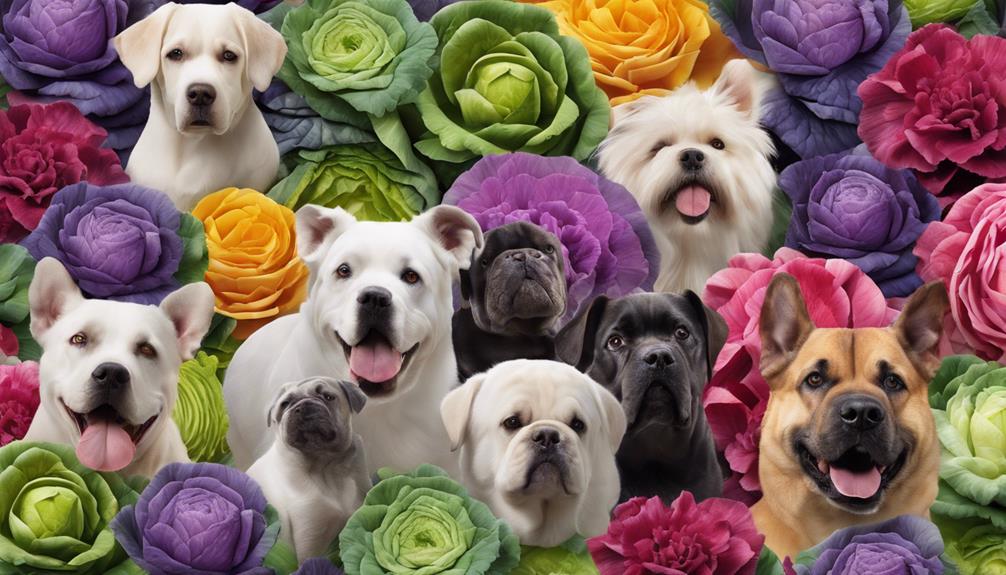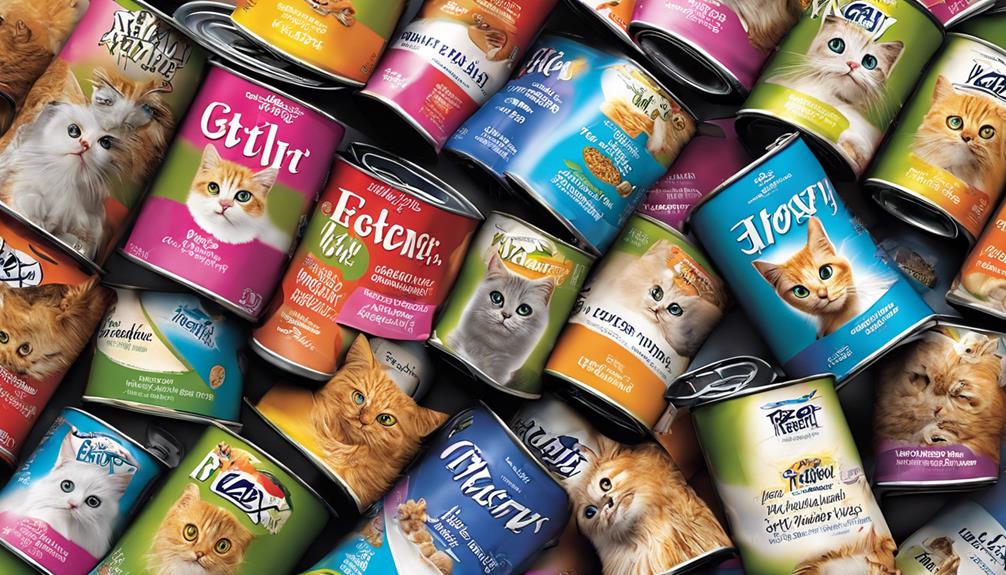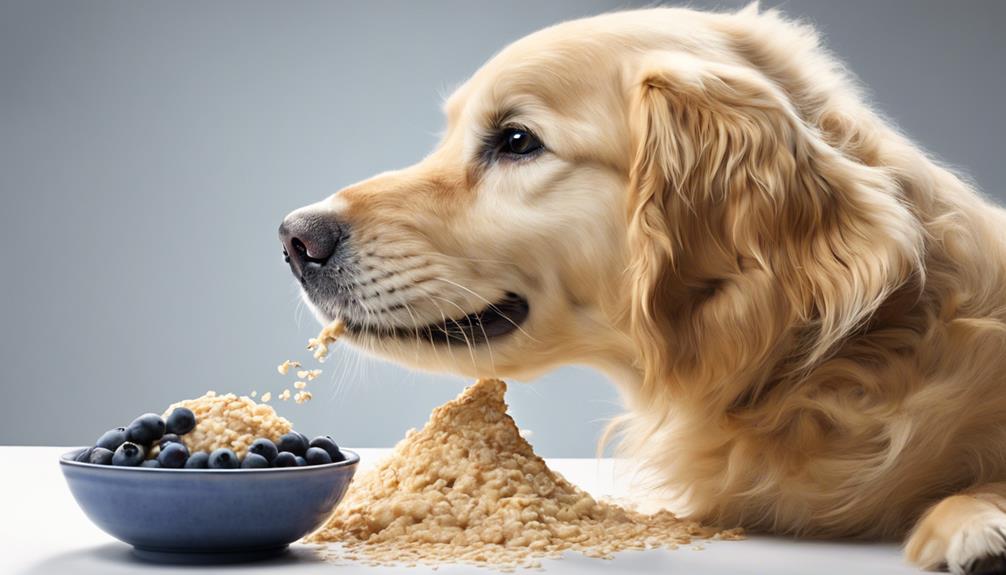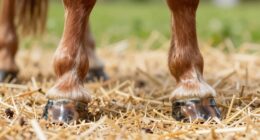Dogs can safely consume cabbage. It’s nutritious and rich in vitamins. However, excessive intake of cabbage can cause stomach upset. Raw cabbage in large quantities can negatively impact their thyroid. To prevent this issue, cook the cabbage thoroughly. Remember to wash the cabbage thoroughly and remove any tough parts before cooking. Steam or boil the cabbage without adding seasoning. Cut it into small pieces for your dog. Begin with a small amount to observe their reaction. Keep in mind that moderation is crucial. Consider your dog’s size and monitor for any adverse reactions. Consult a veterinarian if necessary. For more information on cabbage and your dog’s diet, click here.
Key Takeaways
- Cook cabbage before feeding to avoid thyroid issues.
- Monitor cabbage intake to prevent stomach upset in dogs.
- Start with small amounts of cooked cabbage for tolerance.
- Remove spices and seasonings when preparing cabbage for dogs.
- Consult a vet if adverse reactions occur from cabbage consumption.
Nutritional Value of Cabbage for Dogs
Cabbage provides essential vitamins, minerals, and antioxidants that contribute to a dog's overall health and well-being. Dogs can eat cabbage raw, benefiting from its high nutritional value. This vegetable is packed with vitamins like K, C, B6, and B1, which are vital for a dog's health.
The minerals present in cabbage, such as manganese, copper, and potassium, support various bodily functions in our furry friends. Red cabbage, known for its cancer-fighting properties, can be a great addition to a dog's diet.
The high fiber content in cabbage promotes a healthy gastrointestinal system in dogs, aiding in digestion. Additionally, the antioxidants found in cabbage help bolster the immune system of dogs, reducing the risk of diseases.
When feeding cabbage to dogs, make sure it's prepared appropriately and follow feeding guidelines to maximize its health benefits. Remember, a balanced diet is key to keeping our canine companions happy and healthy.
Potential Risks of Feeding Cabbage
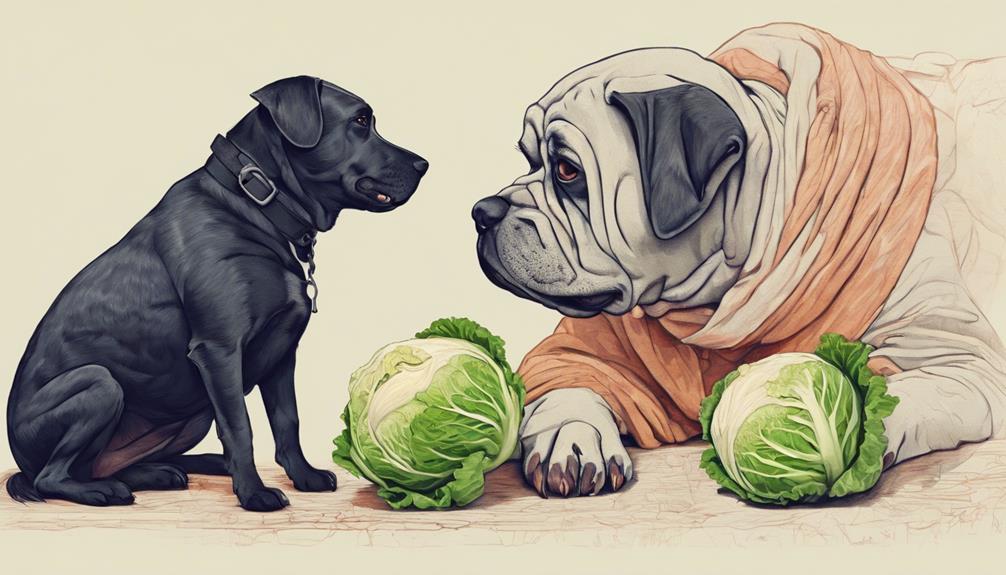
When incorporating cabbage into a dog's diet, it is important to be mindful of the potential risks associated with its consumption. Excessive cabbage intake can lead to stomach upset and gas in dogs. Raw cabbage, when overeaten, contains thiocyanate that can cause hypothyroidism in dogs. However, cooking cabbage thoroughly eliminates the compound affecting the thyroid gland, making it safer for consumption. Moderation is key when feeding dogs any color or form of cabbage to prevent digestive issues. To guarantee the safety of your furry friend, avoid adding spices or seasonings when preparing cabbage for them.
| Potential Risks of Feeding Cabbage | Effects | Precautions |
|---|---|---|
| Stomach Upset | Gas and discomfort | Feed in moderation |
| Hypothyroidism | Thyroid gland disruption | Cook thoroughly |
| Digestive Issues | Upset stomach | Monitor portion sizes |
| Spices and Seasonings | Digestive disturbances | Serve plain cabbage |
| Thiocyanate Content | Thyroid issues | Regulate consumption levels |
Safe Ways to Prepare Cabbage
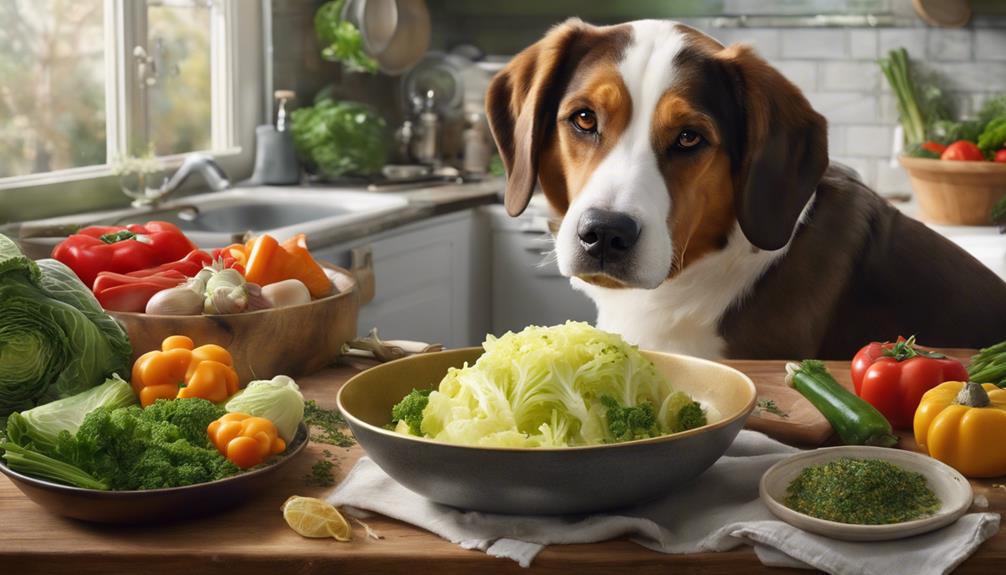
For the safety of your canine companion, it's important to prepare cabbage for them by washing it thoroughly to remove any dirt or contaminants before cooking.
Once the cabbage is cleaned, remove the tough stem and core to prevent any choking hazards.
When cooking the cabbage, opt for simple methods like steaming or boiling without adding any seasonings that could be harmful to dogs.
After the cabbage is cooked, make sure to cut it into tiny, bite-sized pieces. This will make it easier for your dog to eat and digest, reducing the risk of any digestive issues.
Remember to start by feeding your dog a small amount of cooked cabbage to see how they react.
Moderation in Cabbage Consumption
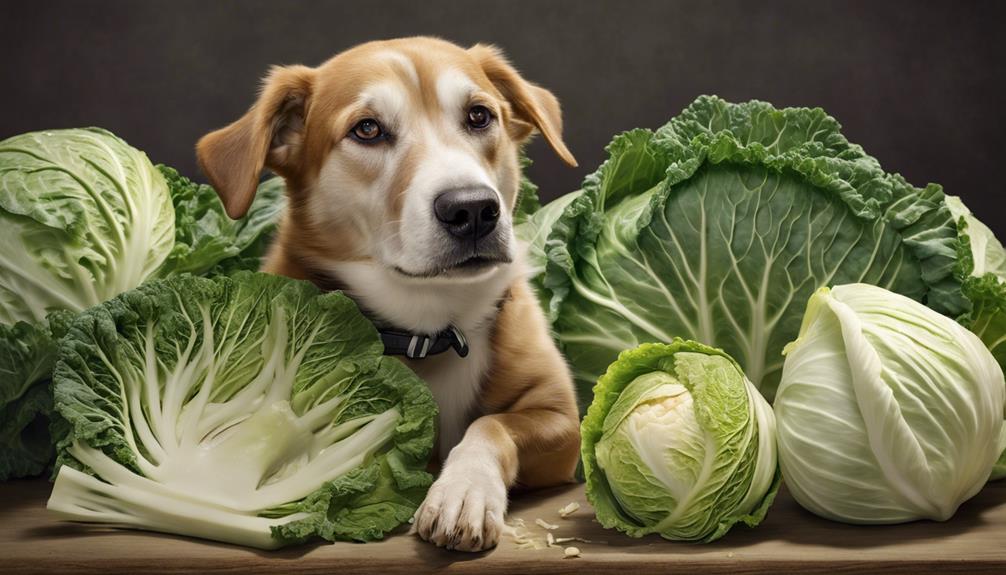
After preparing cabbage safely for our furry friends, it becomes important to consider the significance of moderation in their cabbage consumption. While dogs can eat cabbage, it's essential to practice moderation to avoid potential issues. Excessive consumption of cabbage can lead to digestive problems such as gas and bloating in our canine companions. Additionally, the presence of thiocyanate in cabbage can impact thyroid function in dogs if consumed excessively. Hence, it's vital to monitor the amount of cabbage given to your dog carefully.
To guarantee your dog's digestive health and overall well-being, consider cooking the cabbage before feeding it to them. Cooking can help with digestion and reduce the risk of gastrointestinal discomfort. Additionally, portion control is key when adding cabbage to your dog's diet. Portion sizes should be adjusted based on the size of your dog, with recommended guidelines ranging from 1 teaspoon to 2 tablespoons or less. Keep a close eye on your dog's reaction when introducing cabbage slowly, especially if they've a sensitive stomach, and consult a veterinarian if you notice any adverse reactions. Remember, moderation is crucial when it comes to feeding cabbage to your furry friend.
Incorporating Cabbage Into Dogs Diet
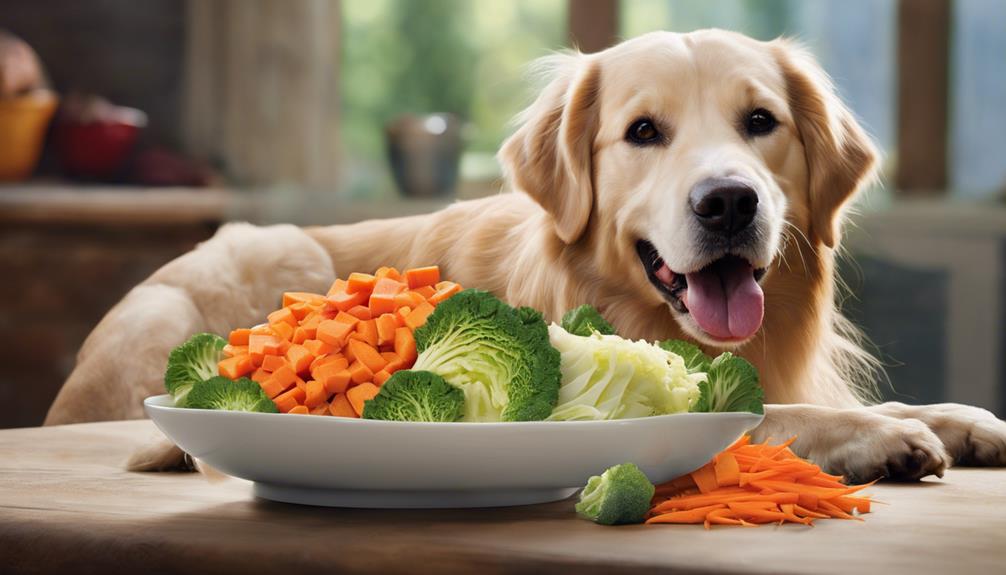
Let's introduce cabbage into your dog's diet gradually to ensure a smooth transition and monitor their digestion closely. When incorporating cabbage into your dog's meals, it is crucial to begin with small amounts to evaluate how well they tolerate it. Here's a useful table outlining the advantages of adding cabbage to your dog's diet:
| Benefits of Cabbage for Dogs | |
|---|---|
| Good source of vitamins | Aids in overall health |
| Rich in minerals | Helps support a strong immune system |
| High in fiber | Promotes good digestion |
Frequently Asked Questions
Can a Dog Eat Cabbage Safely?
Yes, dogs can safely eat cabbage. It's important to remember that moderation is key to prevent any digestive issues. Cooking the cabbage before giving it to your furry friend can help with digestion. Both red and green cabbage are safe options for dogs, but it's vital to control the portion size.
Before adding cabbage to your dog's diet, consult with a vet, especially if your pup has a sensitive stomach. Watch for any negative reactions after they eat cabbage to make sure it agrees with them.
Are Cabbage Plants Poisonous to Dogs?
Cabbage plants aren't toxic to dogs, making them safe for consumption in moderation. Both red and green cabbage are non-poisonous for dogs and can provide essential nutrients like fiber, vitamins, and minerals.
However, importance is key to avoid digestive issues. Always wash cabbage thoroughly to eliminate any potential pesticides or contaminants before feeding dogs.
Should I Let My Dog Shred a Cabbage?
We should let our dog shred cabbage because it can be a fun and engaging activity for them. Supervising the process is key to preventing any issues with ingestion.
Shredding cabbage can serve as a low-calorie treat and a way to involve our furry friend in meal prep. It's important to monitor the amount consumed to avoid digestive problems.
Can Cabbage Cause Vomiting in Dogs?
Yes, cabbage can cause vomiting in dogs. The fiber content and potential digestive upset from cabbage may lead to this reaction.
It's important to monitor symptoms of vomiting in dogs after consuming cabbage. Gradually introducing cabbage can help prevent vomiting.
If your dog experiences persistent vomiting after eating cabbage, seek veterinary advice promptly.
Stay informed and keep your furry friend safe and healthy.
Can Dr. Marty’s Nature’s Blend Freeze-Dried Raw Dog Food Include Cabbage as a Safe Ingredient?
Yes, cabbage can be a safe ingredient in Dr. Marty’s Nature’s Blend Freeze-Dried Raw Dog Food. According to Dr Marty’s dog food reviews, cabbage is a healthy addition to the diet and can provide essential nutrients for dogs. It is important to introduce new ingredients gradually to avoid any digestive issues.
Is Seaweed as Safe for Dogs to Eat as Cabbage?
Seaweed and cabbage offer different benefits for dogs. While cabbage is generally safe for canine consumption, the same cannot be said for seaweed. Dogs and seaweed consumption may pose risks due to its potential high iodine content, which can disrupt their thyroid function. It’s advisable to consult a veterinarian before introducing seaweed into your dog’s diet.
Conclusion
To sum up, feeding cabbage to your dog can be a safe and nutritious option when done in moderation and prepared properly. While some dogs may experience digestive issues, overall it can be a healthy addition to their diet.
Remember to always consult with your veterinarian before making any significant changes to your dog's diet. By following these guidelines, you can guarantee that your furry friend enjoys the benefits of cabbage without any unnecessary risks.
